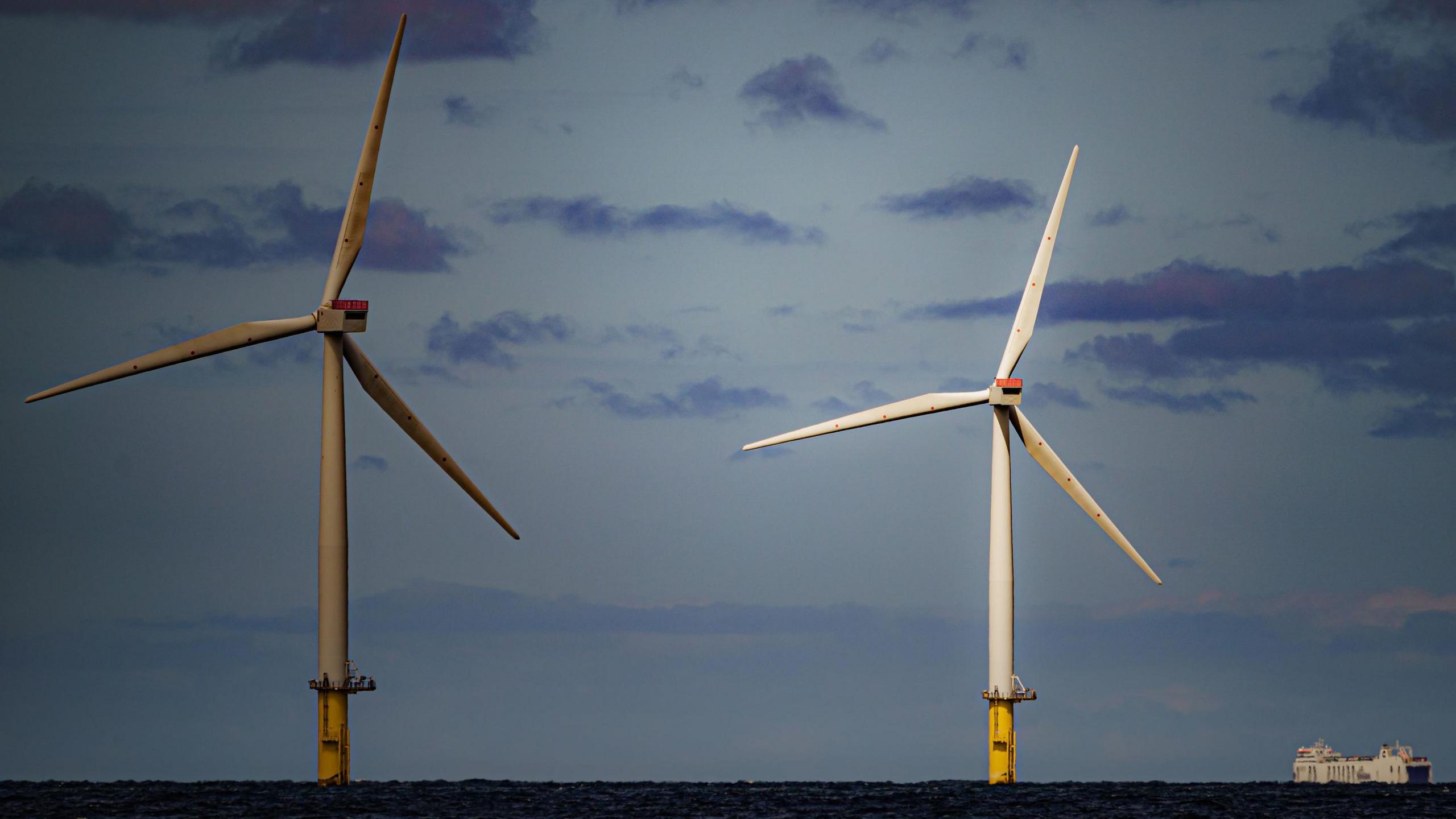Crown Estate energy cash should help Wales - Plaid

The Crown Estate owns the UK seabed out to 12 nautical miles
- Published
Money raised from the Welsh seabed used for energy schemes should directly benefit Welsh communities and "not Westminster", Plaid Cymru has said.
The UK government's new publicly owned energy company, Great British Energy, has announced it will lease seabed owned by the Crown Estate to site offshore windfarms.
Plaid said Wales should be given control of Crown Estate holdings worth tens of millions of pounds with the money used to support Welsh communities.
A UK government spokesman said "devolving the Crown Estate would cost vital jobs" and delay key projects.
The Crown Estate belongs to the reigning monarch, and the revenue from its £16bn property portfolio goes directly to the UK Treasury.
It owns the UK seabed out to 12 nautical miles.
UK secures seabed land deal to boost windfarms
- Published25 July 2024
What would 'GB Energy' mean for Scotland's green economy?
- Published23 June 2024
Royals to get extra £45m as Crown Estate profits soar
- Published24 July 2024
Under the announcement, British seabed owned by the Crown Estate will be used to help build windfarms in plans aimed at making the UK more self-reliant for energy.
It is the first big announcement by Great British Energy.
The firm's aim is increase renewable energy projects, boosted by £8.3bn in state funding, paid for by a windfall tax on oil and gas giants.
'Lower bills'
Energy Secretary Ed Miliband claimed the initiative would "lead to lower bills" for households.
But the Conservatives said GB Energy was "nothing but a gimmick that will end up costing families".
The deal means the Crown Estate - which manages a huge portfolio of property and land and helps fund the Royal Family - will lease the land on which wind farms can be developed and built.
The Welsh government has control over agriculture, forestry and fishing, education, environment and health and social care, but devolving the Crown Estate to Wales is something which Plaid Cymru - and others - have long called for.
Both Jeremy Miles and Vaughan Gething backed such a move when they were running for the Welsh Labour leadership earlier this year.
A taxpayer-funded payment, known as the Sovereign Grant, pays for the Royal Family's official duties each year.
It is currently set at 25% of the Crown Estate's annual profits, including a 10% uplift to pay for the refurbishment of Buckingham Palace.
The estate's Scottish holdings were devolved to Scotland in 2016, and its revenue now goes to the Scottish government.
Plaid believes an arrangement similar to Scotland would give Wales a direct say in how the profits from new floating wind farms planned off the Welsh coast would be spent.
'Benefit households'
Plaid’s Westminster leader Liz Saville Roberts said that “profits generated from renewable energy projects on the Welsh Crown Estate must be directed towards Welsh communities, not Westminster”.
She said: “The government’s investment plans largely rely on private investment and they should clearly set out how this will benefit households in Wales, over private companies”.
“Devolution of the Crown Estate is also vital in Wales if we are to ensure that profits made from leasing land for energy projects are retained in Wales, as they are in Scotland”.
A UK government spokesperson said: “Devolving the Crown Estate would cost vital jobs - in places such as Port Talbot - and delay crucial projects such as floating offshore wind that are needed to provide lower bills, cleaner energy, and better jobs.
"GB Energy will invest £8.3bn over the course of the next Parliament and could provide £60bn of private investment to help drive the UK’s energy independence and support households across Wales."
The Welsh government said: “We support the devolution of further powers and the accompanying resources Wales needs to reach net zero.
“Driving forward renewable energy in order to make sure it benefits the climate and our country is a priority for Welsh government and to see the new UK government moving at pace and taking this issue equally seriously is incredibly welcome.”